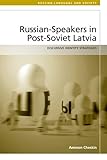Russian Speakers in Post-Soviet Latvia : Discursive Identity Strategies / Ammon Cheskin.
Material type: TextSeries: Russian Language and Society : RLSPublisher: Edinburgh : Edinburgh University Press, [2022]Copyright date: ©2016Description: 1 online resource (248 p.) : 13 B/W illustrations 3 B/W tablesContent type:
TextSeries: Russian Language and Society : RLSPublisher: Edinburgh : Edinburgh University Press, [2022]Copyright date: ©2016Description: 1 online resource (248 p.) : 13 B/W illustrations 3 B/W tablesContent type: - 9780748697434
- 9780748697441
- 306.442917104796
- online - DeGruyter
- Issued also in print.
| Item type | Current library | Call number | URL | Status | Notes | Barcode | |
|---|---|---|---|---|---|---|---|
 eBook
eBook
|
Biblioteca "Angelicum" Pont. Univ. S.Tommaso d'Aquino Nuvola online | online - DeGruyter (Browse shelf(Opens below)) | Online access | Not for loan (Accesso limitato) | Accesso per gli utenti autorizzati / Access for authorized users | (dgr)9780748697441 |
restricted access online access with authorization star
http://purl.org/coar/access_right/c_16ec
A theoretical and empirical study of discourse among Russian-speakers in LatviaThe political shocks of the 2014 Ukrainian crisis have been felt in many former Soviet countries, not least Latvia, where over 35% of the population are native Russian speakers. At a time when analysts and commentators are unsure about Russia's future plans to intervene on behalf of their 'compatriots', this study provides a detailed political and cultural analysis of Russian-speaking identity in Latvia.By using Russian-speakers in Latvia as a specific case study, this volume also offers a fresh methodological approach to the study of discourses and discursive strategies. It outlines a coherent methodology to study the evolution of discourses over time, rather than a single de-contextualized and static time period.Drawing on media analysis, elite interviews, focus groups and survey data, Russian Speakers in Post-Soviet Latvia situates the identity strategies of Russian speakers within the political, cultural, and economic transformations of the post-Soviet era. By assessing political, cultural, and economic links with their home state (Latvia) and their potential kin-state (Russia), it offers important insights into the complex identity positions of Latvia's Russian speakers, and how these positions have evolved in Latvia since the late Soviet period.In a time when many will question the loyalty of Russian speakers to their various 'host states' this book provides a timely, scholarly account of ethnic politics in Latvia. It also offers a methodological framework that allows for the mapping of trends in discursive strategies, exploring how they evolve through time.Key FeaturesUses focus-group interviews, elite interviews, survey data and critical discourse analysis to focus study discoursesFeatures a case study of Russian speakers in Latvia to add to the debate surrounding the status of Russian speakers outside RussiaFocuses on the temporally contingent nature of discourse - discussing discursive change and the possibility that a discourse can exist
Issued also in print.
Mode of access: Internet via World Wide Web.
In English.
Description based on online resource; title from PDF title page (publisher's Web site, viewed 24. Mai 2022)


